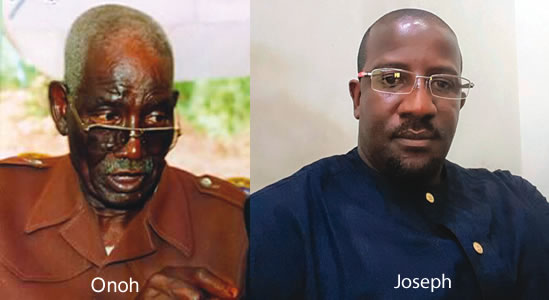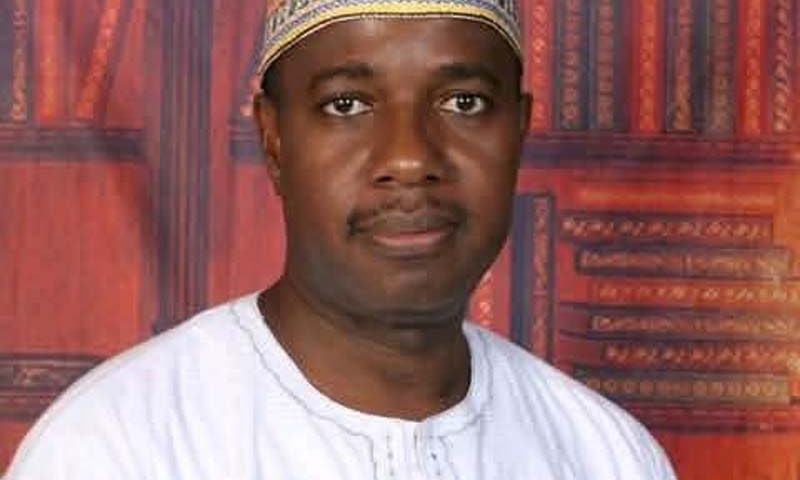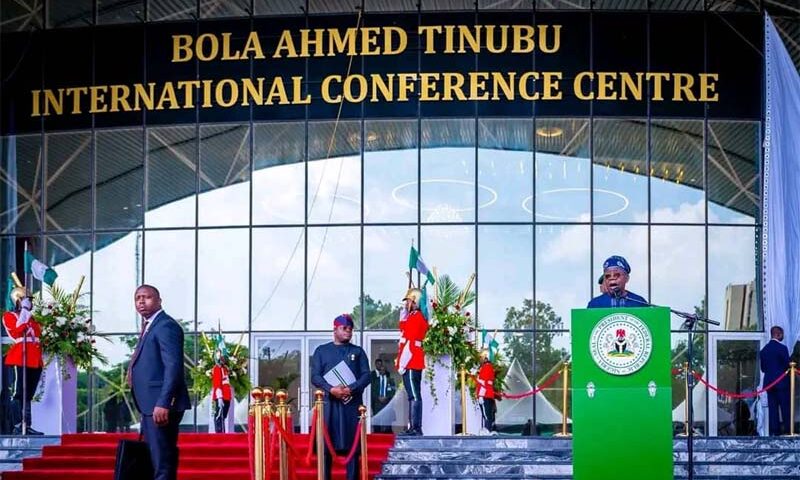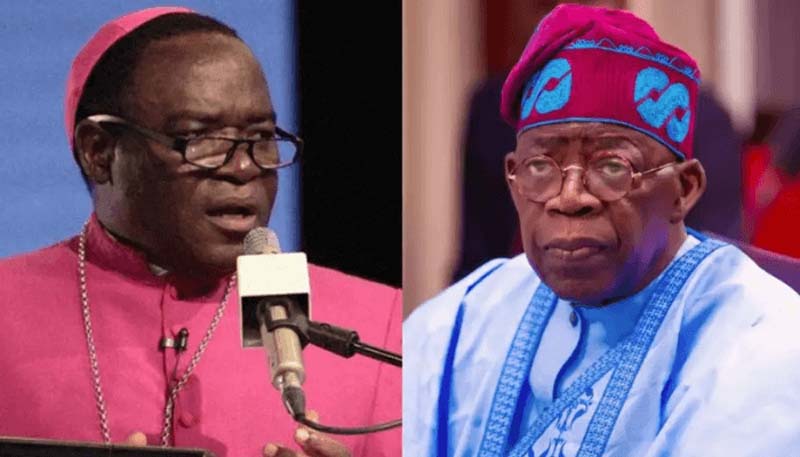– (ex-governor of Old Anambra State)
“Only politicians who stole money go about with police escorts. only criminals would not want people to come near them”
In a revealing interview with Dr. Joseph Onoh, son to the late Chief C.C. Onoh and SSA to Governor Ifeanyi Ugwuany, Anambra State, he discloses the father’s role on the creation of Enugu State, the intrigues, the woes of the present-day Nigeria politicians and the burden of identity of the igboman in Nigeria
Question: Can you tell us about yourself?
I am the last son to of the late Chief Christian Chukwuma Onoh. I am a one-time member of the Enugu State House of Assembly and currently a Senior Special Assistant on Special Projects to Governor Ifeanyi Ugwuanyi of Enugu State. I have been actively involved in politics since 1996, during the formation of the Grassroots Democratic Movement.
Question: Your father was the governor of the old Anambra State a longtime ago but he remains very popular, even after his death. What do you think is the reason for this?
My father believed in some fundamental principles that guided his conduct in public office and as a politician, those principles are absent in the current crop of politicians. As that point in time, some people would regard his attitude to public office as very simple but the fact that people love him and continue to hold him in high esteem even till today shows he was right. He exemplified the qualities of a leader and not a looter.
Question: What fundamental principles did he believe in?
My father never executed any government contract till he died — he never begged for any government contract. He never touched public funds, rather, as the governor, when the state had no money to pay teachers, he used his personal money to pay the teachers and he never got back the money.
This is unlike current political leaders who would not put in their personal resources, but instead, they take from the coffers of the government. As his children, he instructed us never to beg for government contracts, or touch public funds, and that was why, when I was in the House of Assembly, I was the Chairman of the Appropriation Committee but I left without touching any money that was not my salary.
Question: What are the values you learnt from your father?
There are inherent core values that have been guiding us and these values were not just from my father — they came down from his father’s father down to him and he passed them to us. We were thought to stand by our principles, even at the point of death, so long as we know that they are right. My father taught us never to compromise the general good for personal interests and he made us to understand that, even when one is rich, simplicity is the best approach in life.
He stressed that we should not allow our riches to get into our head, he always pointed out that empty containers made the loudest noise. He made us to understand that being born into wealth should not make one lose one’s sense of humanity and should not make one feel larger than life.
He made us to know that we have our greatest friend in the common man who looks up to one with a lot of gratitude for the little one is able to do for them, unlike keeping only rich friends who are only there as cosmetic alliances.
Question: You said your father used his personal money to pay teachers while he was governor. Does that mean he was very rich before he became governor?
I will not say so but I can trace my generation to 317 years ago and we were all wealthy.
You mean you can trace the lineage of the Onoh family to 317 years ago?
Yes and the name Enugu State is actually from my own surname and my village is Enugu Ngwo.
Question: Can you explain better?
It is actually a generational thing because the name Enugu became popular after the 1912 signing of the Enugu Coal Fields to the Nigerian Coal Corporation, which was executed by my grandfather, and before that period, my great great grandfather, Ozo Ananefu Ngwo, Nwaenugu Nwaene, migrated from Benin down to a place that is called Agbaja, which is a section of Nsukka and parts of Awgu, and settled at Enugu Ngwo, which is located at the peak of what is now known as Milikin Hill, which overlooks a vast majority of the city because at the time. He believed that if you live at the higher peak, you could sight your enemies. Unfortunately, Nigeria as a country has no respect for history, and that is why even today, a lot of people from Enugu State don’t even know the concept and meaning of the name ‘Enugu’ and where it came from. That was why my father was willing to lay down his life in pursuit of the creation of Enugu State, although today, some other people will claim to have made more important contributions towards the creation of Enugu State.
Question: Having struggled for the creation of the state, how did your father feel when Enugu State was eventually created?
I can remember that occasion vividly. I arrived in Nigeria on August 22, 1991 and that was a very bad year for us because my brother died during the period so my father was still mourning the loss and the only thing that kept him interested in life was the quest for the creation of the state. On August 28, 1991, I remember he was in his house at Ngwo and Engineer Arthur Eze was there discussing with him including Abel Akwanya, Pelican Motors then. Later, both men left. That morning, before the announcement of the creation of Enugu State, they had a very serious issue with Commodore Ebitu Ukiwe, who played a very strong role but people don’t remember because the Supreme Military Council had to go through the name of the new state.
The name was supposed to be Wawa State, and it was Wawa State that was approved. It was supposed to be Wawa with Enugu as the capital, but because of a lot of political issues, some people, particularly those from the current Anambra State felt threatened because in their own understanding, they thought ‘Onoh has come again.’ They thought it means that once the state is created, all the people from Anambra must leave Enugu. My father was insisting that the name must be Wawa, but Ukiwe kept calling and trying to make him understand that Enugu and Wawa was the same. After long deliberations, he said, okay, if it must be Enugu, it should be called Enu-Ugwu, and that triggered another issue. At about 5pm on that day, August 28, Ukiwe called again and told my father that he had done everything he could do and met with the then Commander-in-Chief, Ibrahim Babangida, that he (my father) already had a state and he should not worry about the name. He was trying to make him understand that he should not allow the issue of the name of the state to make him lose what he had been fighting for most of his life, ever since the end of the civil war. My father said alright.
Then during the 9 o’clock news, I remember that the phone rang, and again it was Commodore Ebitu Ukiwe, and he said to my father, “CC, calm down, we have a surprise for you this evening.” My father turned to me and said, “Oh, that was Commodore Ebitu Ukiwe, go and get me my Gulder’’ and I went to get his drink. He was drinking and smoking, and discussing with Arthur Eze and Abel Akwanya they all left at about 1pm. At exactly 12 o’clock, the announcement was made and it was actually August 29, 1991. The Head of State announced the creation of some states, and behold, Enugu State was born. When my father heard the news, he held the arms of his seat and fell back, and turning to me, he said, ‘Son, go and wake up your mother.’
I went and before long, we heard sirens and it was Arthur Eze and Abel Akwanya. Arthur Eze even came with a cow. I wonder how he managed to get the cow he came with at about 2am. Arthur Eze popped the first champagne and everyone was in celebration mood. Then my father said, ‘‘I am proud today that my work is done, I am willing to meet my maker, for I am leaving a satisfied man.’’ I think that day, August 29, 1991, was the day he made peace with himself because actually, his work was done, apart from continuous efforts to grow Enugu State and make it great. But he had another assignment, and that was when the agitation for Ebonyi State started, because after he achieved the desire for the creation of Enugu State, he said, “During my campaign I promised the people of Ebonyi that they will also have their own state.’’
He believed he was born for a purpose and he achieved it. God blessed him because the two successive military heads of state then, Babangida and the late Sanni Abacha, were his personal friends and they held him in high esteem.
Question: You said your father was a simple man. How did his position as a governor change his lifestyle?
His position did not affect his lifestyle in anyway. Even as a governor, he did not stay in the Government House. He stayed in the house in the village. I remember one day, while he was governor, he left the house by jumping the fence from the back of the house and all the security personnel attached to him were looking for him. They thought he was still upstairs in the room. They did not know he had left the house and entered a bus. By the time the driver and other passengers realised who he was, they started panicking. The driver panicked and started screaming but my father told him, “Son, continue moving.” He paid the transport fare of all the passengers in the bus and they all drove down to the Government House. By the time the security realised what happened, he was already on his way to his office in the Government House.
Question: Why did he do that?
My father never liked protocols, police escorts and sirens. He used to say that only politicians who stole money go about with police escorts. He believed only criminals would not want people to come near them. He always asked why he would need security in his village. For him, it is only those who did something evil that should fear. He would always go to the market square, sit down and eat as he always did.
Question: Even as a governor?
Yes, he never changed. He maintained the same lifestyle. Whenever he was in Enugu, he slept outside the family house in Ngwo.
How did you and your siblings feel as governor’s children despite the fact your father did not fancy the trappings of office?
Being the children of a governor never thrilled us because we were born into wealth and from the day we were born, we had all the paraphernalia of a luxury life at our disposal. I was even more arrogant being my father’s son than being the son of a governor.
He added value to the office of the governor because he seemed larger than life. As his children, we grew up without lacking. We never had to worry about ‘I want’, it was more about ‘Could you get?’ But despite being born into enormous wealth, we were raised up to understand that there is an order to things, a limit to things. We were not supposed to flaunt wealth and throw parties. Growing up, I never threw any party and I never had a car to myself. When I returned to Nigeria, I rode in public buses.
We all went to the stream to fetch water and there is no local food we do not know how to prepare, including okpa. We always went hunting with the local hunters, it was always fun. It could be raining and my parents would tell us to go out in the rain and fetch water and put in the container. My father knew the best firewood for any type of food and my sister, Bianca, is even more locally grounded than any of us. We did the local masquerade. We went to the village square during the full moon for wrestling contests. It was the best of both worlds, and after the holidays in Nigeria, we returned to England, where one has to behave oneself. The white, big chaps always looked one, thinking, ‘Okay, the Africans are back.’ We were all born with dual nationalities, Nigerian and British but we were warned never to use any other passport apart from the Nigerian passport. I have never used any foreign passport. That is why I will always be a Nigerian and I will even die a Nigerian.
Question: Having fought for the creation of Enugu State, did your father try to become the governor of the state?
He once wanted to make a joke when he heard that Jim Nwobodo was contesting for the governorship of the state and he asked us to go and print posters for him, that he was contesting too. That was actually a joke and that was as far as he went. It was never an aspiration.
Question: Your father was known to smoke a lot. From what you said, he also loved his beer…
Yea, that’s the funny thing. All my life, I knew my father drank but never got drunk. There was a song he loved playing, “I ain’t drunk, I am just drinking.’ Whenever I was in the house and I perceived the smell of tobacco, it meant daddy was at home and early in the morning, he always woke at 5am to listen to the BBC. Once I perceived the smell of tobacco, one knew he was up.
Question: Did he discourage you and your siblings from smoking?
That is the thing; parents back then believed that children should be seen and not heard and they believed in strong discipline and there were rules like you should not do this and that. Everything basically was a taboo. In the house, the cigarettes and drinks were there but my father would tell us, “Don’t take these things, but if you actually don’t believe me, better try” and because he gave us the liberty to try them out, we ended up not doing it. I don’t smoke, I don’t drink. My elder brother doesn’t smoke. Though we could indulge in any vices, we never found any fascination in doing so. That is the way I am raising my kids.
Question: Do you see your father as a disciplinarian?
He was not a disciplinarian but he commanded respect. So, in meeting him, one would discipline oneself. He was not a disciplinarian but the respect he commanded disciplines one. That’s how he was.

Question: What was his opinion on the perceived marginalisation of the Igbo?
He actually always said Igbo have failed in the core values of what they were supposed to aspire for. He said they compromised their needs for their wants. Growing up, I remember him always saying that the greatest problem of the Igboman was trying to adapt and possess another person’s environment and showing more of contempt and disdain for his. That is why he always used Anambra as an example, saying they have money but would rather waste the money fighting each other than use it to develop the state. There are very few Igbo people, even from my state in Enugu, that have shown interest in developing their state. They would rather go to Lagos to build mansions and do everything for all to see.
Question: Did your father express these views publicly?
He always did.
Question: How did his Igbo political associates receive his views?
He had little or no respect for those of them that were compromised, those that will dance and sing like canaries for the highest bidder that gives them money.
Question: Has your father’s name ever opened doors for you?
I learnt a lot of things from my father when he was alive and one thing he always told us was that when great men die, a lot of their friends abandon their children and he would always say ‘Never you allow yourself to get into that position.’
Growing up, I learnt to nurture an independent friendship with my father’s friends outside my father. So when my father died, his friends that came, came because though they were his friends and also my friends. The name ‘Onoh’ opens doors because I also make efforts. If as a person I did not achieve anything, I don’t think the name would open those doors. My relationship and association with people today has more to do with me as a person and not just because I am Chief C. C. Onoh’s son.
Original scripts submitted by IHUOMA CHIEDOZIE for Punch Newspapers (2017)






